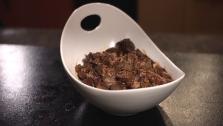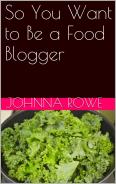Guest Post: Raw-Volutionizing Your Diet
I think everyone will agree with me when I say most of us, men and women alike, have at one point or another, struggled with weight. It is not surprising that according to the National Health and Nutrition Examination Survey (NHANES), it was said that over two-thirds of adults in the United States are classified as overweight or obese.
There are endless studies being done on why obesity rates continue to rise in developed nations, and what causes this increase and what can be done about it. One’s lifestyle, the fast food industry, the role of hormones and body structure, are but a few of the “culprits” tagged by many of these studies. Although there may not be one single reason or a quick solution to the problem, one thing is clear: our food choices play a big role in managing weight.
Given that the way we decide what to eat, whether it is the amount of food we consume or the types of food we consume, it is important to recognize that by making little changes in the way we eat, we can make our way to a better, healthier self.
One diet that caught my attention recently is the raw food diet. Granted that it isn’t really “new” (in fact if you recall, it was even featured at one point in the popular HBO television series Sex and the City), it continues to gain popularity and following from health-conscious individuals. Some raw foodies start out with wanting to lose weight, others with the goal of detoxifying their system then they go back to their regular diets, but some really embrace the lifestyle and commit to it because of its supposed benefits.
So what exactly is a raw food diet? Basically, a raw food diet, as the name suggests, is composed primarily of uncooked food, which are mostly organic in nature and is more often than not, unprocessed. It comes from the belief that raw food is most healthful to the body because when we cook our food, or subject it to too much heat, the healthy enzymes in the food is damaged, thus our body is not able to benefit from it. Although there are some raw food enthusiasts who go completely raw in their diet, many opt to go about 50-70% raw in terms of food consumption. Similarly, “cooking” or subjecting food to temperatures below 104-118 degrees Fahrenheit is acceptable to some raw food communities.
When I first came across raw foodism, or rawism as described in Wikipeida, I assumed that practitioners of this diet would be completely vegan and would eat nothing but greens and the like. However, as I read further, I realized that it is not always the case. Take for example raw fish or sashimi. In the Philippines, they have this dish called kinilaw which is basically a mix of raw fish stewed (but not cooked) in vinegar, chilis, onions, tomatoes, garlic and peppers. Meat can also be eaten raw, such as carpaccio.
Although the diet has piqued my interest, I have not yet mustered up enough courage to really give it a try. Perhaps soon, who knows? After all, according to the various articles and blog entries that I have read, it offers a lot of great benefits ranging from clearer skin to better digestion, and even feeling more energetic and strong on a raw food diet. Some studies even show that increasing the amount of raw food (particularly vegetable matter) in one’s diet can reduce the risk for certain types of cancer due to the increased amount of phytonutrients that is absorbed by the body. Other benefits include weight loss and decreased risk for lifestyle diseases, especially since it contains less trans fats and has more of the “good” fats in it. Also, raw foods are said to help balance out the acidity/alkalinity in the body.
Although some raw foodies swear by this lifestyle, it is not without its cons, as with everything. For one, because raw food or unprocessed food include bacteria and other micro-organisms, this can become a concern if it overpopulates in the digestive tract. These bacteria are often killed by heat and since raw food is uncooked, it may become problematic. Similarly, if the food is mishandled or exposed to bacteria and was not cleaned properly, this can have the potential of causing harm to the consumer.
Nutritional deficiencies can also be a concern. Studies show that people on raw food diets can potentially Vitamin B12 deficiencies, although this can be reduced by taking supplements and monitoring the type of foods consumed. Similarly, people with diabetes or hypoglycemia may encounter problems with their sugar levels on a raw food diet.
As with any diet, before revolutionizing your food intake, I suggest you these points into consideration:
1. Why am I doing this?
2. What do I want out of this?
3. Is this right for me?
Here’s to happy, healthy eating.
*Marina Chernyak is a fitness freak, online entrepreneurs and owner of a nesting doll store located at MatryoshkaNestingDolls.com
Category: Food.Fun.Stuff.










